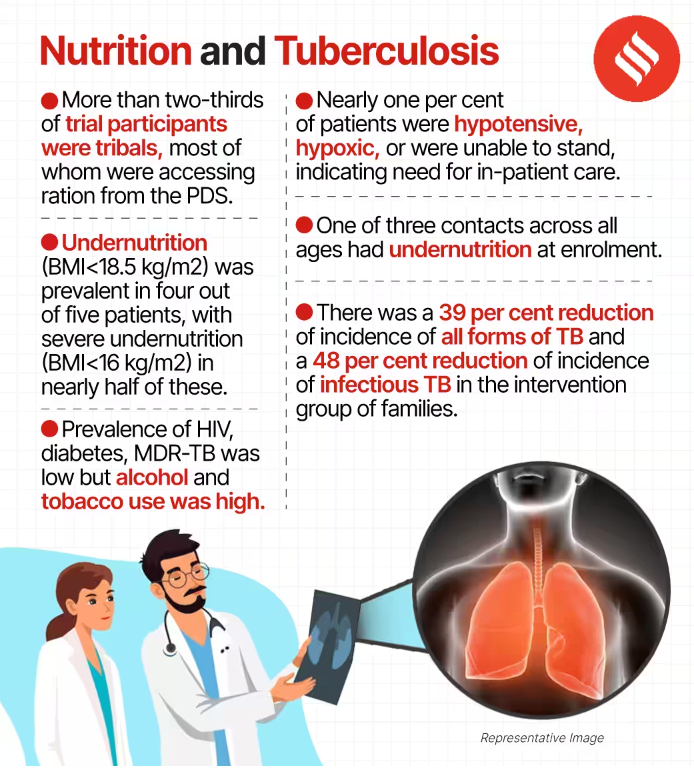Social Issues
Nutrition's Role in Tuberculosis Prevention
- 21 Aug 2023
- 5 min read
For Prelims: Tuberculosis, ICMR, Nikshay Poshan Yojna
For Mains: Challenges to eliminating TB, India’s progress in eliminating TB
Why in News?
Recently, two studies conducted by the Indian Council of Medical Research (ICMR) and published in prestigious journals such as The Lancet and The Lancet Global Health, have unveiled a pivotal connection between nutrition and tuberculosis (TB) prevention.
- Reducing Activation of Tuberculosis by Improvement of Nutritional Status (RATIONS) trial shows correlation between nutritional support and the reduction of TB incidence.
- Weight gain's impact on TB mortality revealing how increased weight among malnourished TB patients correlates with reduced mortality rates.
Note:
- As per WHO, India accounts for 27% of the global TB incidence and 35% of total TB-related deaths.
- India is set to eliminate TB by 2025.
What are the Key Highlights of the Studies?
- A total of 5,621 people were given the nutrient-dense food for a year while 4,724 people received food parcels with no extra nutrition.
- At the end of the trial, there was a 39% reduction in TB incidence in the intervention group versus the control one.
- Weight gain decreased the risks of tuberculosis mortality in severely malnourished TB patients in Jharkhand.
- Instantaneous risk of death was reduced by 13% for a 1% weight gain and 61% for 5% weight gain.
- The study involved 2,800 severely malnourished TB patients in Jharkhand, with a prevalence of undernutrition in 4 out of 5 patients.
- Nutritional support was provided to individuals responding to TB drugs for six months, while the duration was 12 months for those with multidrug-resistant tuberculosis.
- An early weight gain in the first two months was associated with a 60% lower risk of TB mortality.
- Patients showed higher treatment success, better weight gain, and low rates of weight loss during follow-ups.
What is Tuberculosis?
- About:
- Tuberculosis is an infection caused by bacteria called Mycobacterium tuberculosis. It can practically affect any organ of the body. The most common ones are lungs, pleura (lining around the lungs), lymph nodes, intestines, spine, and brain.
- Transmission:
- It is an airborne infection that spreads through close contact with the infected, especially in densely populated spaces with poor ventilation.
- Symptoms:
- Common symptoms of active lung TB are cough with sputum and blood at times, chest pains, weakness, weight loss, fever and night sweats.
- Treatment:
- TB is a treatable and curable disease.
- Anti-TB medicines have been used for decades and strains that are resistant to 1 or more of the medicines have been documented in every country surveyed.
- Multidrug-resistant tuberculosis (MDR-TB) is a form of TB caused by bacteria that do not respond to isoniazid and rifampicin, the 2 most powerful, first-line anti-TB drugs.
- MDR-TB is treatable and curable by using second-line drugs such as Bedaquiline.
- Extensively drug-resistant TB (XDR-TB) is a more serious form of MDR-TB caused by bacteria that do not respond to the most effective second-line anti-TB drugs, often leaving patients without any further treatment options.
- Multidrug-resistant tuberculosis (MDR-TB) is a form of TB caused by bacteria that do not respond to isoniazid and rifampicin, the 2 most powerful, first-line anti-TB drugs.
What are India's Initiatives to Combat TB?
- Pradhan Mantri TB Mukt Bharat Abhiyan.
- National Strategic Plan (NSP) for Tuberculosis Elimination (2017-2025).
- TB Harega Desh Jeetega Campaign.
- Nikshay Poshan Yojna .
Indian Council of Medical Research (ICMR):
- Indian Council of Medical Research (ICMR) is the apex body in India for the formulation, coordination and promotion of biomedical research.
- It was founded in 1911 with the name of Indian Research Fund Association (IRFA) and renamed as ICMR in 1949.
- It is funded by the Government of India through the Department of Health Research, Ministry of Health & Family Welfare.







